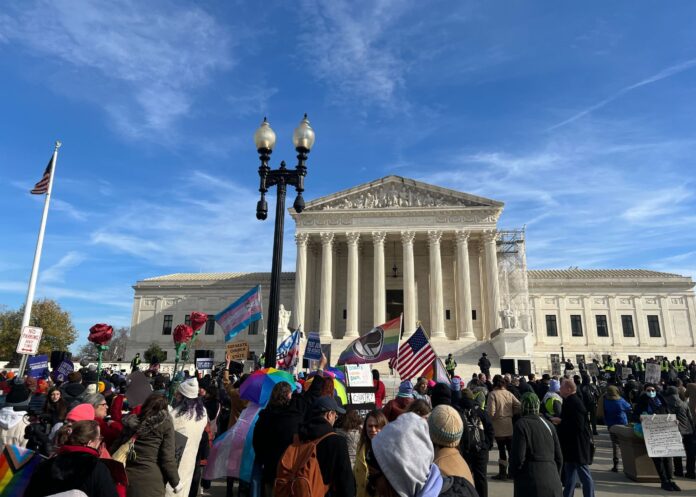
The U.S. Supreme Court heard oral arguments Dec. 4 in the case of U.S. v. Skrmetti, et al. At issue in the case are two laws, one in Kentucky and one in Tennessee, that ban gender-affirming care for minors experiencing gender dysphoria.
The case came to the nation’s high court by way of the 6th Circuit Court of Appeals, which overturned the preliminary injunction put in place by the district courts in Tennessee and Kentucky.
The Supreme Court convened over one specific issue in the case: whether the laws discriminated based on sex and were therefore subject to the higher scrutiny standard required by the equal protection clause of the 14th Amendment.
The case has drawn a significant amount of attention. While the court heard arguments from the U.S. Department of Justice, the American Civil Liberties Union and the Tennessee Attorney General & Reporter, protestors from both camps gathered in front of the court on a cold winter morning in D.C.
Several amici briefs have already been filed. On the side of the U.S., which is opposing the laws, a number of medical organizations, including the American Academy of Pediatrics, the American Medical Association and the American College of Physicians, filed an amicus brief.
Two other amici briefs were filed in support of the U.S. One from a collection of international LGTBQ+ rights organizations and another from 57 transgender adults, including the actor Elliot Page, who have received gender-affirming care.
On the side of Tennessee, the state of Alabama filed an amicus brief.
The oral arguments lasted nearly two and a half hours. U.S. Solicitor General Elizabeth Prelogar opened the arguments, asserting the U.S. government’s position that the laws were subject to a higher standard of scrutiny because they discriminated based on sex.
During Prelogar’s arguments, Chief Justice John Roberts commented that there was medical nuance in the area of gender-affirming care, which was a line of questioning, and comments were also advanced by Justices Samuel Alito and Brett Kavanaugh.
Justice Sonia Sotomayor discussed the health impacts brought on by gender dysphoria. She also commented on the purpose of heightened scrutiny in the court system and said that there was evidence that some children need gender-affirming treatment.
The second attorney in the argument for the respondents was Chase Strangio. Strangio is co-director of the ACLU’s LGBT & HIV Project, and is now the first openly transgender attorney to argue before the Supreme Court.
Strangio said that he agreed with the U.S.’s arguments and that the only difference was that he believed the law failed under any standard of review. He told the court that it wouldn’t break new legal ground to apply heightened scrutiny to the case.
On the side of Skrmetti, the Solicitor General for Tennessee, J. Matthew Rice, argued that the law imposed across-the-board rules on the medical purpose of the drugs used in gender-affirming treatment, not on the sex of the recipient of the treatment. The drugs used in gender-affirming care are used in other medical treatments.
Justice Ketanji Brown Jackson asked Rice how the law wasn’t a sex-based classification. Rice emphasized that the bill did not draw a sex-based line but instead drew a purpose-based line on the medication use.
In a different line of questioning, Kavanugh asked Rice if other states were free to make choices different than those made by Tennessee. In response, Rice said that they were and that the question of gender-affirming care was one for state legislatures.
In a press conference following the arguments, Strangio said he was honored to represent his clients and transgender adolescents who made medical decisions that were then banned by the Tennessee law.
“Today we were able to stand before this court and say the Constitution protects trans people just like it protects everyone else,” Strangio said. “It is breaking no new ground to recognize that when you are prohibited from receiving something because of your sex, it is the role of the courts to ensure that the government can satisfy its burden of showing that it has a good reason for doing so. Tennessee did not meet their burden. This law, we believe, is unconstitutional, and perhaps the scariest thing for all of us is that Tennessee’s arguments would apply if Congress tomorrow banned this care nationally.”
“At the end of the day, we hope the court sees it as we do. But no matter what happens, we will keep fighting,” Strangio added.
Tennessee Attorney General Jonathan Skrmetti, in a separate press conference following the arguments, said that this case was about protecting kids from the consequences of decisions that they don’t fully understand. Skrmetti claimed that the rise in minors seeking hormone treatments was driven by ideological pressure rather than scientific evidence.
“The people of Tennessee, acting through a bipartisan supermajority of their elected officials … passed SB-1 to protect kids,” Skrmetti said. “Half the states in the U.S. have done the same. The Constitution allows the states to protect kids from unproven, life-altering procedures based on uncertain science. The states have exercised the power to regulate the practice of medicine for hundreds of years, it’s one of the fundamental things that they do. Tennessee’s laws draw a line based on age, which is something that the laws do all the time.”
Srkmetti said that they made a good argument that rational basis applied, rather than heightened scrutiny, and that they will see if the Supreme Court agreed with their argument.

